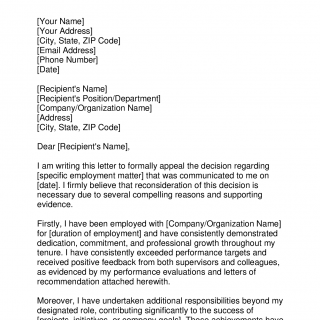Job Appeal Letter
Request for Review and Reconsideration
A job appeal letter serves as a formal communication submitted by an employee to contest a decision related to their employment. Its purpose is to request a review and potentially secure a favorable outcome regarding matters such as denial of promotion, salary adjustment, or other workplace concerns.
Parts of a Job Appeal Letter:
-
Heading: Include the sender's name, address, email address, phone number, and the date the letter is written.
-
Salutation: Address the recipient by their name or job title (e.g., "Dear [Recipient's Name]" or "To Whom It May Concern:").
-
Introduction: Begin with a clear and concise statement presenting the decision being appealed and the reason for writing the letter.
-
Grounds for Appeal: Enumerate the specific grounds for the appeal, providing a detailed explanation for each. Include relevant facts, evidence, and any supporting documentation.
-
Argument for Reconsideration: Present a persuasive argument emphasizing why the decision in question should be reevaluated. Use logical reasoning, professional language, and highlight the potential benefits or positive outcomes of reconsideration.
-
Supporting Evidence: Attach any additional documents that support the presented grounds for appeal. These may include contracts, performance evaluations, letters of recommendation, or any other relevant materials.
-
Conclusion: Express appreciation for the recipient's attention and request a thorough review of the appeal. Provide contact information and encourage prompt communication.
Sample of Job Appeal Letter
[Your Name][Your Address][City, State, ZIP Code][Email Address][Phone Number][Date][Recipient's Name][Recipient's Position/Department][Company/Organization Name][Address][City, State, ZIP Code]Dear [Recipient's Name],I am writing this letter to formally appeal the decision regarding [specific employment matter] that was communicated to me on [date]. I firmly believe that reconsideration of this decision is necessary due to several compelling reasons and supporting evidence.Firstly, I have been employed with [Company/Organization Name] for [duration of employment] and have consistently demonstrated dedication, commitment, and professional growth throughout my tenure. I have consistently exceeded performance targets and received positive feedback from both supervisors and colleagues, as evidenced by my performance evaluations and letters of recommendation attached herewith.Moreover, I have undertaken additional responsibilities beyond my designated role, contributing significantly to the success of [projects, initiatives, or company goals]. These achievements have not only added value to the organization but also showcased my capability and potential for growth within the company.Furthermore, I have conducted thorough research on industry standards and gathered data to support my request for [promotion/salary adjustment/any relevant change]. I have attached comprehensive market analysis and salary benchmarks reflecting my qualifications, experience, and the prevailing industry trends. These documents highlight how my current salary or position is misaligned with the market rates and my overall contributions to the company.I would like to emphasize that a fair review and reconsideration of my appeal will not only be beneficial for my professional growth but also in line with the organization's interest in retaining top talent and ensuring fairness in the workplace.I kindly request that you thoroughly review my appeal, taking into consideration the evidence and strong justifications presented. I am more than willing to discuss this matter in person or provide any additional information that may be required during the review process. You can reach me at the contact details provided above.Thank you for your attention to this matter. I sincerely hope for a favorable outcome and an opportunity to further contribute to the success of the organization. I look forward to your prompt response.Yours sincerely,[Your Name]
Strengths:
- Allows employees to contest employment decisions in a formal, respectful manner.
- Provides an opportunity to present arguments, evidence, and testimonials to support the appeal.
- Can potentially lead to a favorable outcome and resolution of workplace conflicts.
Weaknesses:
- Success is not guaranteed, as the decision ultimately rests with the recipient or the organization handling the appeal.
- Requires careful drafting and presentation of compelling arguments for reconsideration.
Opportunities:
- Gives employees a chance to advocate for their rights, fair treatment, and professional growth.
- Helps maintain open lines of communication within the workplace by providing a channel for dispute resolution.
Threats:
- In some cases, a negative outcome may strain employee-employer relationships and potentially affect job security.
- If not properly handled, the appeal process may cause further disputes or divisions within the workplace.
Related and Alternative Forms:
- Grievance letter: Similar to a job appeal letter, it addresses employee concerns but focuses on formal complaints regarding workplace mistreatment, discrimination, or policy violations.
- Request for Change of Employment Terms: A letter requesting modifications to aspects of employment, such as work schedule, duties, or salary.
The letter can be submitted via email or traditional mail, depending on the company's preferred method for receiving formal correspondence. It is recommended to keep a copy of the letter for personal records. The recipient or the organization's Human Resources department typically handles the storage of the letter and related documentation.
Application Examples and Practical Use Cases:
-
A denied promotion: An employee writes an appeal letter to contest the decision, providing evidence of their qualifications, achievements, and contributions to the company.
-
Salary adjustment request: An employee appeals the denial of a salary increase by presenting market data, performance metrics, and testimonials from colleagues or clients.
Successful appeals may lead to improved job prospects, increased job satisfaction, and better working conditions. Unresolved or unsuccessful appeals may result in continued dissatisfaction, limited career growth, or strained relationships within the organization.
By following the guidelines outlined above, employees can construct an effective job appeal letter to contest employment decisions, seeking a fair review and potential reconsideration.

